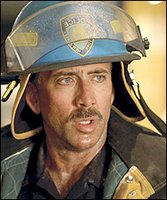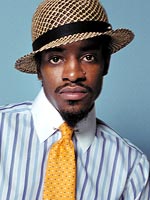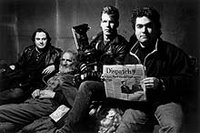Sunday, January 07, 2007
THE FILM REVIEW STEW IS MOVING!
Hi film fans! The Film Review Stew is moving to a new location on the web, with an impressive presence, high-quality images, and some amazing pages. You can check them out at www.filmreviewstew.com and see what all the fuss is about.
Eventually we'll be tearing down this blog site, but not for a few more months. So you can enjoy the web presence here for a tad longer. Thanks and we hope you enjoy the new site!
Wednesday, January 03, 2007
BEERFEST

THUMBS DOWN FILM REVIEW RATING!
Ever heard of that movie Beaches starring Bette Midler and Barbara Hershey? Yeah? Well BEERFEST is the anti-Christ by comparison. We’re talking Mars and Venus here.
I have little doubt that every fraternity across the nation now has a DVD copy of Beerfest sitting in a place of reverence. The title alone would dictate that as a necessity. Not to mention the story is about beer, drinking beer, puking beer, death by beer, beer games, and secret beer recipes. Normally the destruction of brain cells is reserved for those who actually drink beer (I’ll admit that I imbibe on a very modest level), but watching this film will probably kill off a few extra IQ points all on its own.
Director/actor Jay Chandrasekhar isn’t known for his thought-provoking material anyway, and this should give you pause before sliding this silicon disc into your DVD player. Ever heard of the remake of The Dukes of Hazzard? Jay was the director.
The biggest problem with Beerfest is that it tries to pull up a plot via a film that doesn’t really have one. It’s supposed to be about two brothers, Jan Wolfhouse (Paul Soter) and Todd Wolfhouse (Erik Stolhanske), who take their grandfather’s ashes to Germany in order to intern them only to stumble upon a Fight Club-style organization devoted to drinking beer. The two brothers are humiliated to learn that their grandfather may have stolen an ancient beer recipe and fled Germany with a prostitute (their grandmother played by Cloris Leachman). The man who gives them this bitter news is none other than Wolfgang Von Wolfhaus (Jurgen Prochnow), the ring leader of Beerfest and embittered descendant of the man who lost the sacred recipe stolen by Jan and Todd’s grandfather.
After being disgraced by Wolfgang and the German drinking team, Jan and Todd return to America and form up their own Team USA Beerfest drinkers. They include the two brothers plus Landfill (Kevin Heffernan), a man who can drink beer by the truckload; Barry (Jay Chandrasekhar himself), a former beer ping-pong champion fallen on hard times who now lives under a bridge and sells himself as a male prostitute; and finally Fink (Steve Lemme), a Jewish professor with a penchant for masturbating frogs.
As Team USA’s beer bellies fill out, Team Germany sneaks onto U.S soil after they discover that Todd and Jan have found the secret beer recipe stolen so long ago. They do this via the funniest portion of the film. In a lake near the Wolfhouse brothers’ restaurant, Team Germany lurks beneath its surface in a submarine. With them is Jurgen Prochnow who comments, "I don’t want to stay here too long. I don’t like submarines. Had a bad experience in one once." This is obviously in reference to the excellent film Das Boot. But here is where any semblance of high-comedy ends and the sophomoric plunges onward. The obligatory multiple exposed breasts scene, the party house shot, the farting and belching humor, and the penis jokes all rule the rest of the movie.
Sunday, December 31, 2006
LADY IN THE WATER

THUMBS UP FILM REVIEW RATING!
What makes a movie watchable? Mostly it’s good acting, a good screenplay, and a story that has emotional weight. So it is most strange to see the many harsh reviews of this film which I’m sure kept ticket-buyers away from the theater when professionals started pummeling LADY IN THE WATER.
Entertainment Weekly said, "[It is] Shyamalan’s most alienating and self-absorbed project to date" (as if that has anything to do with the story being told). The Philadelphia Enquirer called it, "...extremely silly." And the New York Observer said, "Hollywood cannot pollute the ozone with anything more idiotic, contrived, amateurish or sub-mental than Lady in the Water."
Ouch.
No wonder so few went to see it after reading things like that. I know I shied away specifically because of them. But I’d also seen a few positive reviews. Nothing big, really. I attributed most of these to Shyamalan die-hards who’d love anything put out by him regardless of subject matter. That wasn’t the only thing that kept me away from the theater, though. Having fell in love with The Sixth Sense (like 99% of the rest of you), I sludged through Unbreakable, Signs, and then The Village. None of them were stellar and they lacked that umpf! we’d come to expect from M. Night. So having invested money and time in many of his previous works, I was extremely hesitant to spend more of either on something that many "respected" reviewers found, to say the least, tepid.
So when I plopped in the DVD this week and started watching Lady in the Water, I was prepared for the worst. Surprisingly, that’s not what I found.
If films are supposed to be about entertainment, then Lady in the Water most certainly meets that challenge. Not only that, but I found Paul Giamatti’s performance to be outstanding. Not since Sideways had I enjoyed a Giamatti film so much. He, in fact, carried most of the movie with his excellent portrayal of Cleveland Heep, an apartment manager who one night finds a narf (a water creature) swimming in the compound’s pool. The narf is named Story and is played by Bryce Dallas Howard (the blind girl from M. Night’s The Village). The movie delves deep into Fairytale-Land and plants the audience firmly in its belief structure. The fact that Story has shown herself to Cleveland is very important in the film, and it shows us that this is something special. Cleveland is given the opportunity to heal himself through Story’s visit, and in the process bring together everyone in the apartment complex. All of the people within the apartment building have been drawn here for this one event: to see a narf safely on her way to becoming a segue between the blue world (i.e., the narfs) and the human one.
The quirky, quaint, and scarey intermingle here as we see a movie reviewer monologuing during a funny yet frightening scene, watch Cleveland come to terms with the death of his family from years before, and witness the battle between humps of grass that come to life with razor sharp teeth and threaten to destroy Story.
The heart-wrenching scene between Cleveland, the apartment building’s occupants, and the mortally wounded Story has such impact as to cause most watchers to reach for the tissue box.
The ending is extremely satisfying and filmed perfectly. When Story has to leave, she does so in fairytale fashion.
This is a great story. My only regret now is that I didn’t see it in the theater. I’m sure the sound and scenery were even better on the big screen.
I also have to wonder about Warner Brothers and the "falling out" that they had with M. Night over the film during production. Budget, screenplay and time constraints weighed heavy on all of the parties involved and I think this may have had an impact on reviewers and how the film was marketed. Are some reviewers leery of praising a film from a large studio when that studio has problems with a director/writer? Perhaps. Perhaps not. But the negative reviews of the film seem far out of proportion with what I watched.
Lady in the Water was well acted, had a decent screenplay, and told a great story. I’m glad I saw it.
Wednesday, December 27, 2006
THE HOLIDAY

A HESITANT THUMBS UP FILM REVIEW RATING!
Romantic comedies abound in cinema. Sleepless in Seattle, When Harry Met Sally, French Kiss, Bridget Jones’ Diary, and The Whole Nine Yards are just a few of the more recent ones in this genre. THE HOLIDAY certainly falls headlong into this category, but does so with the addition of it taking place around the Christmas season. Writer/director/producer Nancy Meyers is very familiar in the RomCom arena. Her repertoire contains such gems as Private Benjamin and Father of the Bride (we’ll forgivingly overlook the Father of the Bride II debacle for the moment).
What The Holiday has going for it is some good dialogue and even better acting. Cameron Diaz, Kate Winslet, Jude Law, and Jack Black round out the prime roles. The story starts with Amanda (Cameron Diaz, In Her Shoes) as she ejects her live-in boyfriend from her home. She’s an intense young woman who’s the CEO of her own upstart company that makes movie trailers. Her lifestyle is getting the better of her and she decides she needs a holiday.
Iris (Kate Winslet, Finding Neverland) is in love with one of her close working colleagues and decides she needs a mental health getaway from the constrained English countryside. But what to do. Ah! House swap!
Iris and Amanda fly across the Atlantic and take over each other’s residences. Iris lands in L.A. to find a beautifully manicured house with every possible accouterment, while Amanda drags herself up the snow-laden driveway to a cramped but quaint English cottage. Initially Amanda hates what she finds. The quiet life doesn’t suit her. But then she runs into Iris’ brother Graham (Jude Law, Closer) and a one-night stand turns into something Amanda never thought possible. Iris, in L.A., struggles with falling out of love with her ex-beau who is soon to be married but won’t stop bothering her (he calls, sends emails, etc.). But Iris develops a unique friendship with Miles (Jack Black), a sound mixer for films, and she sees in him the same failings her own relationships have.
Although very predictable, the powerhouse actors and actresses with the superb dialogue made this flick enjoyable. The handsome Jude Law will make young viewers swoon and the sexy Cameron Diaz will appeal to men who still have an inkling of testosterone flowing through their veins.
Jack Black has toned down his hyperactivity and settled into a fine role (although some may miss his outlandish behaviors of ol’). His "breast graze" lines are funny and poignant, making us love him for his calmly delivered antics this time.
Kate Winslet sheds her Titanic persona and goes back to what she knows: being a regular English actress. Her simple demeanor was quite well pulled off for someone who tends to have a more haughty acting history, showing that she can ugly down a bit and act in ways we may have forgotten.
All-in-all this is a pretty predictable romantic comedy but the script is so strong and the acting so well done that it deserves plenty of accolades.
NIGHT AT THE MUSEUM
 A VERY HESITANT THUMBS UP FILM REVIEW RATING!
A VERY HESITANT THUMBS UP FILM REVIEW RATING!
Looking for a fantasy-filled escapist flick? You’d be hard-pressed to find a funnier one this holiday season than NIGHT AT THE MUSEUM.
Initial concerns of a Jumanji rip-off are quickly put to rest as we learn that the results of inanimate things coming to life at a history museum are the result of an Egyptian tablet with supernatural powers.
The fun comes when Larry Daley (Ben Stiller, Starsky and Hutch), a down-on-his-luck father who has difficulty holding down a full-time job while worrying about losing his pre-teen son to his ex-wife’s new beau, picks up the improbable job of night-guard at the natural history museum. He meets up with the old guards played by Dick Van Dyke, Mickey Rooney, and Bill Cobbs, as they are supposedly being pushed out of their jobs in favor of a leaner staff.
Larry is obviously uninformed and unprepared for what happens to the museum when night falls, but quickly learns the ropes. Skeletal T-Rex is simply a puppy who loves to chase his own bones. But the African monkey is a kleptomaniac that absconds with Larry’s keys, instructions, and other items, making his job a living nightmare. Then there’s the big lions and the miniature cowboys and gladiators that battle all the time in favor of expanding their empires. And let’s not forget Attila the Hun who’s a misunderstood heathen that benefits from Larry’s psychoanalysis.
While Larry battles to save his job (not to mention his very life), he also struggles to maintain a working relationship with his son Nick (Jake Cherry, Friends With Money) who’s losing faith in his father’s ability to be an upstanding guy with permanent employment and a permanent address.
Thanks to Teddy Roosevelt (Robin Williams in a much more tempered role than previously seen), Larry learns to risk everything in order to save not only his job, but the fate of everyone in the museum and the financial status of the museum itself.
The fun parts are always whenever Stiller interacts with the inanimate creatures as they pop to life. His psychoanalysis of Attila the Hun is one of the outstanding moments, as is his quest to find out who the strange looking guy is who wanders the halls (we later learn that it’s Christopher Columbus). Mickey Rooney has little screen time but makes the most of it in hilarious fashion as he cold-cocks Stiller. And watching Dick Van Dyke do roundhouse kicks to Stiller’s face is something to marvel and laugh at, making one wonder how Van Dyke’s hips don’t dislocate.
Although not a very thought-provoking film, Night at the Museum will certainly entertain. You won’t learn anything, and the plot is straight out of a pat Hollywood script (with happy endings for everyone). But with the holiday season nearly passed, it’s a nice remembrance that sometimes fantasies do come true.
WORLD TRADE CENTER

THUMBS DOWN FILM REVIEW RATING!
When most movie-goers think of Oliver Stone, they usually think of cutting edge (Born on the Fourth of July), or visceral film-making (Natural Born Killers), or even historically disturbing cinema (The Doors). But few — if any — would consider Stone schmaltzy or an opportunist. Watching WORLD TRADE CENTER, though, one can’t help but feel a touch of the latter and a significant amount of the former.
UNITED 93 was similar in that it took the recent horrific events of 9/11 and reintroduced Americans’ fears to that awful day. It utilized (for better or worse) those feelings we all have and made money off of it. This isn’t as terrible as it sounds, though. Cinema has been doing this for as long as celluloid has been running through projectors, but never has the filming been so close to the actual date of the events (or at least rarely).
One can’t help but think that Stone must’ve been desperate for film material or somehow felt closely connected to the events that day. Either way, the script (although based on actual events) was lackluster at best. There are just a few exceptions that we’ll cover in a moment.
This is the (true) story of the port authority police officers that responded to the World Trade Center attacks on 9/11, and is specific to the two men from the port authority who were trapped and later rescued from under the rubble. Nicholas Cage (The Weather Man) stars as John McLoughlin, a gruff Sergeant who was around during the first bombings on the trade centers several years earlier. His entrapped fellow officer is rookie Will Jimeno played by Michael Pena (Crash), a family man with a new baby on the way. Both men have to deal with their isolation and near certain demise as they lay pinned and stranded only a few feet from one another. The story jumps between the rubble strewn men, their wives and families, and a retired marine who feels the call of duty after the attacks and risks his life to find survivors in the buildings’ wreckage (the schmaltzy portions are firmly entrenched here as we’re spoonfed everyone’s tearful response to that terrible day).
It is this "marine" that most might have the biggest trouble with script-wise. He seemed almost inserted into the story to give some grist to an otherwise empty milieu. His need for "revenge" felt hollow amidst so much emotion. And although this may be "the way it was," it didn’t translate well to film.
Interestingly, Nicholas Cage gives an admirable performance even though he’s not jumping into and out of danger, or battling evil-doers with deadly weapons. He’s confined as is co-star Pena and their concern for one another is touching, as is their concern for what will happen to their families as they lay thinking/dreaming about them (these were some of the best parts of the screenplay but only a small portion of the whole).
The most powerful part of the film was its sound editing. When the buildings collapsed and then later continued to creak and groan, they took on an ominous characteristic that brooded poorly for our two main characters and gave movie-watchers a great sense of dread.
But when the sound becomes the most impressive part of a film, there’s more problems than applause.
Tuesday, December 19, 2006
THE QUEEN

AN UNFORTUNATE THUMBS DOWN FILM REVIEW RATING!
Sometimes it's a hit or miss with directors, and with Stephen Frears at the helm the odds of a film being a success versus failure are about fifty/fifty. He has given us some excellent cinema such as High Fidelity, Dangerous Liaisons, and The Grifters. But sometimes his movie eye misses the mark or lacks an intriguing or well-rounded story. Mrs. Henderson Presents, Mary Reilly, and Hero are just a sprinkling of Frear films that had a good shot at being great, but ultimately failed in coherency, pacing, or some other aspect.
THE QUEEN is certainly a film with some great acting. Helen Mirren is spot-on as Queen Elizabeth II, as was Michael Sheen in his portrayal of Tony Blair. But from here the cast sags quite a bit. James Cromwell picked up the part of Prince Philip, but seemed very out of place since he has been typecast in such things as The West Wing TV series and The Sum of All Fears flick. And Sylvia Syms (as The Queen Mother) and Alex Jennings (as Prince Charles) were difficult to see in their respective roles since they are still in the public eye. Although Queen Elizabeth is still in the spotlight, Helen Mirren's strong portrayal made that role much easier to swallow.
Fresh subjects are tough to hit upon anyway, and you have to give credit where it is due; Stephen Frears certainly deserves some acclaim for simply attempting to make a film about the Royal Family and their reaction (or non-reaction) to Princess Diana's accidental death. But herein lies another problem: plot. There isn't one. The Queen is a reactionary tale, focusing mainly on Queen Elizabeth and the newly installed Prime Minister Tony Blair, and how each of them views the country's response to Di's death. Of course, the Queen deals with it by not dealing with it. While Mr. Blair continually tries to save the monarchy from self-destructing due to their own ignorance of the peoples' grief. But there isn't a definitive beginning, middle and ending to the story. It's character study of the monarchy will probably be boring to many, especially in the beginning. Most viewers may feel like dozing off after the first twenty minutes of disinteresting royal uppityness.
Although the beginning and middle of the film lag, the ending picks up just enough to make it watchable. The excellent shots of Balmoral Castle and its Scottish surroundings were fairly awesome, as were some analogies regarding the royal deer that roam the outback wildlands.
If you enjoy a good modern day character study, and are interested in the current monarchy, you'll probably eat this film up. But if you're eager for something plot-driven and deeply intriguing, you best look elsewhere.
Friday, December 15, 2006
MRS. PALFREY AT THE CLAREMONT

THUMBS UP FILM REVIEW RATING!
You know when a director with the last name of Ireland does a film about a Scottish lady coming to London that there’s got to be some major appeal.
Independent film lovers will cheer for MRS. PALFREY AT THE CLAREMONT, a story with a strong script, excellent acting, and some sumptuous English scenery.
Joan Plowright (JANE EYRE, 1996) stars as Mrs. Palfrey, an aging widow who’s traveled from Scotland to London to start her life anew in her sunset years. She decides to spend her waning years at a retirement hotel called The Claremont, a somewhat drab locale from what was advertised to Mrs. Claremont in a picture magazine. No matter. She makes herself comfortable, running into The Claremont’s quirky staff and residents. The bellhop is a portly and sonorous balding man who mumbles more than he speaks. And the residents range from overly-nosy to irritatingly grumpy. But most want to know why Mrs. Palfrey’s grandson, Desmond, (whom she calls all the time) doesn’t come to see her.
One potentially rainy day, Mrs. Palfrey is returning from an outdoor excursion, hurrying home, when she stumbles and falls outside a young man’s flat. The 26-year-old man’s odd name is Ludovic Meyer (Rupert Friend, PRIDE AND PREJUDICE, 2005). Ludy (as he likes to be called) helps Mrs. Palfrey and in return asks that she help him write a really great novel. He wants to use her years and experience to aid in his telling of the story. Ludy seems like such a nice young man that Mrs. Palfrey agrees. Ludy walks Mrs. Palfrey home and everyone at The Claremont immediately believes this to be the elusive Desmond. Mrs. Palfrey lets this deception continue and even invites Ludy over for dinner at The Claremont posing as her grandson. Everyone is smitten with Mrs. Palfrey’s faux-grandson and a relationship between Mrs. Palfrey and Ludy starts blossoming.
This isn’t a Harry and Maude relationship. This is a relationship not built on a scrap of sexual innuendo. It is a love of friendship and understanding that reaches deep into each of the characters and pulls out of it a fantastic end of life/beginning of life set of circumstances. The beauty of Mrs. Palfrey at the Claremont is that the story builds on each subsequent scene, moving us deeper and deeper into their lives. We see Mrs. Palfrey’s love of her dead husband, Arthur, and the beginnings of Ludy’s relationship with a beautiful young lady thanks to a movie recommendation by Mrs. Palfrey.
Although the beginning of the film takes a while to catch on (i.e., it may seem painstakingly slow to some), the ending is well worth your time. It is a story that’s been told before, but not with such impact, and this is undoubtedly thanks to the strong script by Ruth Sacks based on Elizabeth Taylor’s bestselling novel (no, not that Elizabeth Taylor).
Also, the filming at the New Forest Palace grounds near the Abbey at Beaulieu was some wonderful visual candy for fans of this film. It was unbelievably beautiful.
One big warning: make sure you keep a box of Kleenex next to you as the story comes to a close. You’ll need ‘em.
Click here for the Mrs. Palfrey at the Claremont movie trailer!
TALLADEGA NIGHTS: THE BALLAD OF RICKY BOBBY

A VERY HESITANT THUMBS UP FILM REVIEW RATING!
Trying to review and rate a movie like this is tougher than most might think. There are those Will Ferrell fans out there that’ll eat up TALLADEGA NIGHTS: THE BALLAD OF RICKY BOBBY. Then there are those that’ll snub it as another foolish not-ready-for-prime-time-style spoof designed to engage our dumbed-down society. But there is a third reason someone might enjoy this rather ridiculous film.
Hopefully there are those movie goers out there that enjoy watching parodies of various lifestyles, and this is where Talladega Nights gets most of — if not all of — its comedic punch. That we witness a southern Nascar driver with all of his conservative leanings hanging out for everyone to see was absolutely hysterical. Ricky Bobby’s (Will Ferrell) big house, multiple gas guzzling cars (Hummers, etc.), a wife who’s gauged on breast quality, and two kids named after a horrible action series ("These are my kids, Walker and Texas Ranger") are all over-exaggerations on conservative values; you wouldn’t dare see one of them driving a hybrid car, for instance.
The entrance of a homosexual Frenchman named Jean Girard (Sacha Baron Cohen, Borat) adds an additional element in the American prejudice category, Ricky Bobby bashing Girard’s foreign heritage while making a fool of Americans’ naivete ("America gave the world Chinese food!")
The challenge of Ricky Bobby to overcome his fear of driving after a horrendous crash is only minimalist humor added to the film. It is, at its core, a spoof on modern southern lifestyle and conservatism, and that is what makes the movie work.
Monday, December 11, 2006
IDLEWILD

THUMBS DOWN MUSICAL FILM REVIEW RATING!
Not being a rapper fan, I can’t identify with those who have a love for Outkast, the musicians responsible for the soundtrack (and much of the acting) in IDLEWILD. I do, however, occasionally enjoy rap-related films; 8-Mile was interesting, and Hustle & Flow I rate as one of my favorite films of 2005. But the cohesiveness of music and story held those two together, while the mish-mash of modern sounds, modern dance moves, and modern lyrics, clashed with the prohibition era time-frame of Idlewild.
Although some of the music was toe-tappingly enjoyable, the blurring choreographed dances made the film very stilted. Rushing from movement to movement with no rhyme and very little reason, the dances held no appeal. The only plus was the very well designed sets and the excellent period costumes.
The acting was also extremely sub-par when comparing Idlewild to other films of this genre (most notably Moulin Rouge and Chicago). Although these two films were more white-washed (i.e., had more Caucasians than black folks), their even-handedness when it came to telling the story through characters and their songs held truer. Part of Idlewild’s problem obviously had to do with the main character, Percival.
Percival is played by Outkast member André Benjamin (Four Brothers). Although Benjamin is building his cinema repertoire, his acting skills often fall flat in Idlewild. His relationship with his father (legendary dance master Ben Vereen) is uninteresting and forced. Even his relationship with his best friend Rooster (Big Boi, another Outkast singer) feels unnatural from beginning to end. And Percival’s love interest Angel (Paula Patton, Deja Vu) is believably drawn into their blossoming relationship, while Percival himself again seems detached and disinterested. I think this is proof positive that good rappers do not necessarily make good actors. The exception to the acting was – no surprise – Terrence Howard (Hustle & Flow). Playing bad guy Trumpy, Howard oozed depravity in nearly every scene; a shining light surrounded by dreary performances.
No musical film review would be complete without mention of the music itself, too. As stated at the beginning, I have no previous knowledge of Outkast or their musical style. In fact, I’d never even heard of them prior to watching this, so I come into it fresh and without a sense of connection to the artists. That said, I don’t think I could listen to Outkast too long without going a bit bonkers. Their style is too disjointed and swings about in a very A-D-D fashion. Maybe it’s a sign of the times. Or maybe I’m just getting too old for this style. But I hesitate to label myself as an old sour-puss. I enjoyed Hustle & Flow so much that I bought the DVD and the soundtrack. Perhaps there is a bridge to be found between modern musicians and the aging baby-boomer like myself. Unfortunately, Idlewild ain’t it.
BROTHER'S KEEPER

BIG THUMBS UP DOCUMENTARY REVIEW RATING!
Making a myopic documentary can often be a death sentence. But delving into one community and one family can be done well if you don’t lose focus. And thankfully directors Joe Berlinger and Bruce Sinofsky (Paradise Lost and 10 Days That Unexpectedly Changed America) inherently realized this and kept their cameras firmly in the faces of the Ward family and their surrounding New York community.
Reeling from the alleged murder of 64-year-old Bill Ward by his brother Delbert, the Ward family and their neighbors circle their wagons in support of Delbert. From the get-go we’re aware of the Ward brothers’ minimal education and unhealthy lifestyle (their home is a stinking shack surrounded by a dairy farm). We’re also privy to the fact that Bill was not a well man. His illness is never fully explained, but one could easily surmise cancer as a cause. Initially the story seems bent toward a mercy killing; Delbert smothering brother Bill one night to "put him out of his misery." But then homosexual incest rears up (none of the Ward brothers were married), as does animosity between the brothers.
Delbert initially confesses to the murder, but without legal representation present and without apparent knowledge of his rights (a pretty big mistake from a legal standpoint). Delbert is arrested but quickly posts bail thanks to the rural community rallying to his side. No one can believe that Delbert killed Bill. Indeed, Delbert confesses his innocence and states that the only reason he admitted to killing Bill was because he wanted to "get back home."
Receiving multiple nominations at film festivals across the globe in 1992, BROTHER’S KEEPER holds quite the moral quagmire for viewers. Some will view Delbert’s confession as solid proof that he did it. Others may feel he was the victim of a legal system that is only interested in prosecuting the least of its citizens. Still others may believe Delbert to be guilty of a mercy killing and be happy at the outcome of the trial.
Regardless of ones legal or moral leanings, this story certainly is gripping in its honesty, showing both sides of the dilemma without flinching.




















